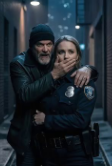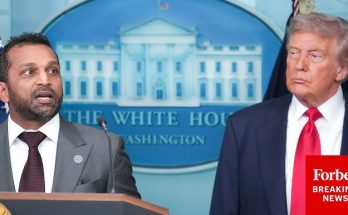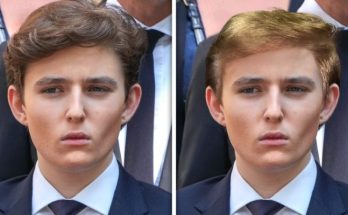Officer Rachel Taus froze, her hand hovering over the butt of her service weapon. She had just stepped out of her patrol car when the figure leaning against the brick wall caught her attention. At first glance, he was just another forgotten soul of the city: dirty clothes, an unkempt beard, long, tangled hair dripping with rain. But his eyes, when they met hers, burned with a terrifying urgency. At his side, a loyal mutt growled, its stare fixed on the deep shadows of the adjacent alley.
Rachel’s instincts screamed danger, but something in his tone made her pause. He didn’t flinch or stumble like someone intoxicated. His voice, though hoarse, carried the weight of a man who had seen too much.
“Behind you,” he whispered again.
She glanced over her shoulder. The dark alley was a maw of wet trash cans and slick brick, but nothing seemed out of place. Still, her gut tightened. The dog’s growl deepened, its hackles raised. Rachel’s training told her to trust both instincts and signals, and both were screaming at her now. The man slowly raised a dirty hand, pointing into the oppressive darkness.
“He’s been waiting there,” he said, his lips trembling slightly. “Watched you drive up. I saw him follow you.”
Rachel’s pulse hammered against her ribs. She pressed her back against the cold metal of her car, her hand now firm on her weapon, her eyes narrowing at the alley’s edge. She whispered sharply, “Who’s there?” Her voice was swallowed by the wet brick walls.
Suddenly, a faint scuffle broke the silence—shoes brushing against pavement, quick and nervous. The homeless man’s dog barked once, sharp and fierce. Rachel raised her flashlight, its beam slicing through the rain like a blade, and a figure bolted from the darkness.
She reacted instantly, her hand snapping her gun from its holster, but the homeless man’s voice cut through the chaos again. “Don’t shoot! He’s got a knife!”
The stranger lunged, a glint of metal catching the dim streetlight. Rachel sidestepped, her foot slipping on the wet ground as the attacker stumbled but didn’t stop, raising the knife high. Just as he lunged again, the homeless man pushed himself forward, intercepting the assailant. His ragged body crashed into the knife-wielding figure, both tumbling into the puddles on the ground.
Rachel froze, her gun raised, trying to find a clear shot without hitting her unexpected ally. The dog barked and snapped, buying precious seconds. The rain poured down, turning the fight into a chaotic blur.
“Get off him!” Rachel shouted.
The homeless man grunted, holding the stranger’s arm back with all his strength. The knife slashed inches from his face, but he didn’t let go. Finally, with a loud crack, Rachel fired a warning shot into the air. The sound shattered the night. The attacker flinched, giving the homeless man just enough leverage to wrench the knife free. It skittered across the wet pavement, landing near Rachel’s boots. She kicked it away. With a swift motion, she pinned the attacker’s arm and clamped the metal cuffs tight. The fight was over.
She turned to the homeless man. His chest heaved with exhaustion, hair plastered to his face. His dog sat loyally at his side, its tail giving a faint, proud wag. For once in her career, Rachel realized her life had been saved not by her training, not by backup, but by someone society dismissed as worthless—someone who had nothing, yet risked everything.
She holstered her weapon slowly. “You could have been killed,” she said quietly.
The man shrugged, wiping rain from his forehead. “So could you,” he rasped. There was no pride in his voice, only a simple truth.
Rachel felt a pang of guilt for the suspicion she’d felt just minutes before. She gestured toward her car, thinking he might need a hospital, but he shook his head. “No hospitals,” he said firmly.
Instead, she offered him a blanket from her patrol car. He accepted it silently. Crouching down, she studied him more closely. Beneath the dirt and weariness, she saw a sharp intelligence in his gaze. He wasn’t just another homeless man; he had a story, hidden beneath layers of pain.
“Thank you,” Rachel said softly. Two words, heavy with sincerity.
The man looked at her for a long moment, as though measuring her honesty. Finally, he nodded, his lips curving into the faintest shadow of a smile.
She radioed for backup. Within minutes, flashing lights painted the street in strokes of red and blue. When one officer asked who had stopped the attacker, Rachel simply replied, “He did.” A heavy silence followed, filled with disbelief.
The homeless man shifted uncomfortably, wanting only to disappear back into the shadows. Before he could slip away, she stopped him. “Wait. What’s your name?”
He hesitated, then answered in a whisper. “David.”
It was simple, almost fragile, like a truth he hadn’t spoken in years. As the rain eased, she offered him a ride to a shelter, but he declined again. She didn’t push. Instead, she left him with packaged meals from her trunk. Driving away, Rachel couldn’t shake his image from her mind. Her duty wasn’t just to enforce the law, but to see the humanity in those society ignored. And tonight, that lesson had been written in rain and courage. She promised herself, this wouldn’t be the last time she saw him. Heroes come in many forms, and sometimes they wear rags instead of badges.
The next morning, Rachel felt compelled to search for David. The city swallowed people like him, blurring their faces into the background, but she didn’t give up. Days later, while patrolling a quieter district, she spotted a familiar figure. His dog, Max, perked up at the sound of her car.
“Thought you’d forgotten,” David said hoarsely as she approached.
“Not a chance.” She handed him a fresh sandwich and bottled water.
She sat on the curb beside him, ignoring the stares of passersby. “Why’d you do it?” she asked after a long silence.
He scratched Max’s ear, his eyes fixed on the pavement. Finally, he said, “Because no one else would. And because you didn’t look at me like I was trash.”
His words struck her deeply. Over the following weeks, Rachel made a point to check in on him. She’d bring food, a blanket, or sometimes just conversation. David was reluctant to share his story, but pieces slipped through. A steady job, a small apartment, a life unraveled by an accident and medical bills. Through it all, his dog had been his anchor. “He saved me more than once,” David admitted, rubbing Max’s head.
Rachel started noticing how sharp his mind was. He spoke several languages, knew history and literature. “You’re wasted out here,” she told him once.
He only smiled bitterly. “The world doesn’t want men like me anymore.”
But Rachel disagreed. One stormy night, she found him sheltering under a bridge and insisted he come with her, just for the night, to the precinct’s spare cot. When he entered the station, curious eyes followed. Some officers whispered, some sneered, but Rachel stood firm. “He saved my life,” she reminded them, silencing the room.
The experience left an impression on David. “It felt strange,” he admitted later. “Like I didn’t belong, but also… like I remembered what it was to be human again.”
Their bond grew into a quiet friendship. She looked forward to their conversations, to the quiet wisdom he carried. But trouble wasn’t far. One evening, she was called to a disturbance and found David cornered by a group of gang members. She rushed in, shouting, and they scattered as backup arrived. David had bruises on his face, but Max was safe. That night, Rachel stayed longer than she should have, patching his wounds with a first-aid kit.
“You don’t owe me this,” he muttered.
“You saved me once,” she said firmly. “Now it’s my turn.” For the first time, David didn’t argue.
A few weeks later, a desperate call came in about a missing child who had vanished in a park. Hours passed with no leads. Just as hope was dimming, David appeared, Max pulling eagerly at his side.
“He’s in there,” David said, pointing to a locked maintenance shed. Skeptical but trusting him, Rachel broke it open. Inside, they found the terrified boy. Her colleagues stared in disbelief as David simply walked away, whispering, “The dog knew.”
Rachel couldn’t stay silent any longer. She called after him. “David, people need you. Not just me. Everyone. You have more to give than you realize. Don’t let the world tell you otherwise.”
The words hit him harder than any storm. For the first time, he allowed himself to imagine a different life. The next day, Rachel spoke with her captain, explaining everything. At first, the captain scoffed, but her persistence wore him down. “Fine,” he said. “I’ll meet him.”
When David was brought to the station, he looked uncomfortable under the fluorescent lights. But Rachel stood beside him, introducing him not as a vagrant, but as a hero. The captain offered David a chance: part-time work at the station as a translator for immigrant communities. At first, David resisted, but Rachel urged him gently. “It’s not charity,” she said. “It’s purpose.”
Finally, he agreed. His first day was rough—stares, whispers, doubt. But when he helped a frightened family explain their case, everything changed. People saw his worth. For the first time in years, David wasn’t just surviving. He was living.
Weeks turned into months. David became part of the team. His skills, intuition, and courage made him invaluable. Slowly, he began to rebuild his sense of self. Rachel saw the transformation unfold, and with it, her feelings deepened. She realized she didn’t just admire him; she cared for him in a way that scared her.
One evening after a long shift, she found him outside the station. “You look different,” she said softly.
David chuckled. “Cleaner clothes, maybe.”
Rachel shook her head. “No. You carry yourself differently. Like someone who belongs.”
David grew quiet, then whispered, “That’s because of you.”
Months later, David moved into a modest apartment, his first home in years. Max had his own corner with a bed and toys. One evening, as Rachel helped him unpack, David paused. “You saved me,” he whispered.
Rachel shook her head. “No. You saved yourself. I just reminded you who you were.”
He was formally recognized for his bravery at a city ceremony. Standing on stage, he fidgeted nervously, but Rachel’s presence in the front row steadied him. When asked to speak, he didn’t tell a story of heroism. Instead, he said, “I’m not a hero. I’m just a man who was given a second chance. Don’t look at me. Look at those you ignore every day. They matter, too.”
The applause that followed was thunderous.
That night, as they walked home together, the city lights glowing around them, Rachel slipped her hand into his. David stiffened, then relaxed, letting a warmth he hadn’t felt in years flood through him.
“Do you ever think about tomorrow?” Rachel asked quietly.
David looked at her, then at Max, and a small smile touched his lips. For the first time in years, he replied, “I actually do.”
It was hope, fragile but real. Under the city lights, with Max resting peacefully between them, a cop and a man the world had forgotten found not just survival, but the promise of a new life, built together.


